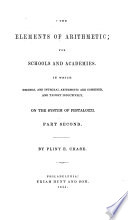 | Pliny Earle Chase - Arithmetic - 1844 - 246 pages
...common difference is 4. Any three of the five following things being given, the other two may be found : 1. The first term. 2. The last term. 3. The number of terms. 4. The common difference. 5. The sum of all the terms. PROBLEM I. One of the extremes, the common difference,... | |
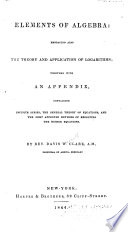 | Davis Wasgatt Clark - 1844 - 394 pages
...387. From the above formulas it appears that there are five things to be considered in geometrical progression, viz. : 1. The first term. 2. The last term. 3. The ratio. 4. The number of terms. 5. The sum of the terms. Any three of these being given, the remaining... | |
 | Benjamin Greenleaf - Arithmetic - 1844 - 352 pages
...other terms, the means. Any three of the five following things being given, the other two may be found. 1. The first term. 2. The last term. 3. The number of terma. 4. The common difference. 5; The sum of the terms. PROBLEM I. The first term, last term, and... | |
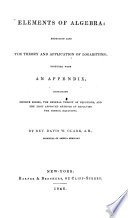 | Davis Wasgatt Clark - Algebra - 1846 - 374 pages
...387. From the above formulas it appears that there are five things to be considered in geometrical progression, viz. : 1. The first term. 2. The last term. 3. The ratio. 4. The number of terms. 5. The sum of the terms. Any three of these being given, the remaining... | |
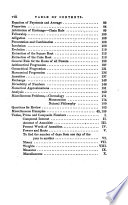 | Pliny Earle Chase - Arithmetic - 1848 - 244 pages
...common difference is 4. Any three of the five following things being given, the other two may be found : 1. The first term. 2. The last term. 3. The number of terms. 4. The common difference. 5. The sum of all the terms. PROBLEM I. One of the extremes, the common difference,... | |
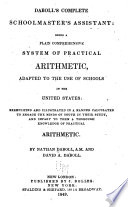 | Nathan Daboll, David Austin Daboll - Arithmetic - 1849 - 260 pages
...first and last terms of which are called the extremes. A series in progression includes five parts, viz. : 1. The first term. 2. The last term. 3. The number of terms. 4. The common difference. 5. The sum of all the terms : by having any three of which given, the other two... | |
 | Roswell Chamberlain Smith - Arithmetic - 1850 - 314 pages
...like Arithmetical Progression, any three of them being given, the other two may be found, viz : — 4. 1. The first term. 2. The last term. 3. The number of terms 4 The sum of all the terms. 5. The ratio. 5. A man purchased a flock of sheep, consisting of 9 ; and by agreement,... | |
 | Roswell Chamberlain Smith - Arithmetic - 1856 - 334 pages
...Arithmetical Progression, any three of them being given,- the other two may be found, viz : — 4. 1. The first term. 2. The last term. 3. The number of terms 4 The sum of all the terms. 5. The ratio. 5. A man purchased a flock of sheep, consisting of 9 ; and by agreement,... | |
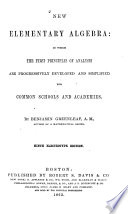 | Benjamin Greenleaf - 1863 - 338 pages
...progression, if we regard the number of terms as limited, there will be five elements for consideration : — 1. The first term. 2. The last term. 3. The number of terms. 4. The common difference. 5. The sum of the terms. These are so related to each other, that, any three of... | |
 | Francis Walkingame - 1865 - 222 pages
...8 = 64. In Geometrical Progression the eame five things are to be observed as are in Arithmetical. 1. The first term. 2. The last term. 3. The number of terms. 4. The equal difference or ratio. 5. The sum of all the terms. NOTE. — As the last term in a long series... | |
| |